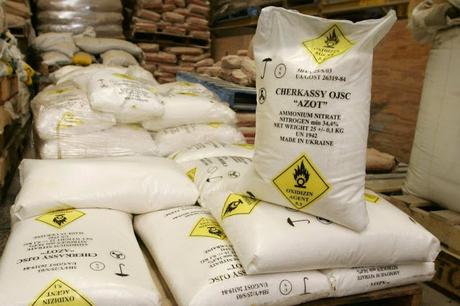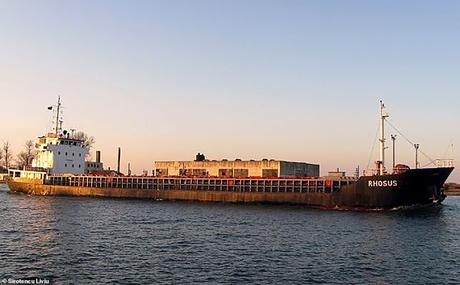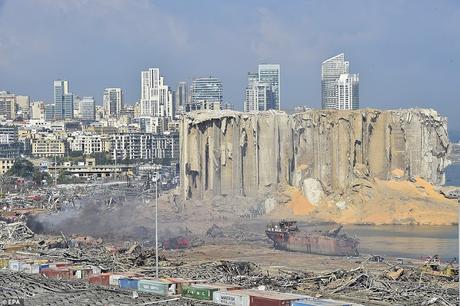Marine Cargo insurance protects cargo in movement from one place to another – for many centuries, goods have been transported across countries; Ports and harbours flourished.MV Rhosus was one of the thousands of ships, was carrying load, wasdetained en route from Batumi, in the ex-Soviet republic Georgia, to Mozambique, and never recovered. It reportedly was owned by Russian businessman Igor Grechushkin and was abandoned in Beirut, Lebanon, after the ship was declared unseaworthy and the charterers lost interest in the cargo. The cargo it was carrying was later confiscated and brought to shore ! ~ normal it sounds !The ship was built by Tokuoka Zosen K.K. in Naruto, Japan, as Daifuku Maru No. 8 and delivered in 1986. Subsequently it changed many hands had name changes once as New Legend Glory; then in 2008,Panamanian-registered Briarwood Corp, acquired the vessel and renamed it Rhosus.

On 23 Sept 2013, Rhosus set sail from Batumi, Georgia, to Beira, Mozambique, carrying 2,750 tonnes of ammonium nitrate. In October, it was forced to port in Beirut with engine problems. After inspection by port state control, Rhosus was found unseaworthy, and it was forbidden to set sail. The owner of Rhosus went bankrupt and after the charterers lost interest in the cargo, the owner abandoned the ship. Rhosus then quickly ran out of provisions, while the crew were unable to disembark due to immigration restrictions. Creditors also obtained three arrest warrants against the ship.Court in Beirut allowed the crew on board to return home after having been stuck aboard the ship for about a year. The cargo was then brought ashore in 2014 and placed in a building, Hangar 12, at the port, pursuant to a court order, until it exploded ! with catastrophic consequences, in August 2020.Since Dec 2017, the whereabouts of Rhosus have been unknown and the ship is reported as "unknown" in official databases.

M/S.Sri Amman Chemicals vs The Additional Secretary was an interesting case decided in the High Court of Judicature at Madras on 12 November, 2019
The Lebanese capital Beirut was rocked on 4.8.2020 evening local time by an explosion that has killed at least 78 people and injured thousands more. The country’s prime minister Hassan Diab said the blast was caused by around 2,700 tonnes of ammonium nitrate stored near the city’s cargo port. Video footage appears to show a fire burning nearby before the blast.The catastrophic explosion at Beirut port on Tuesday evening that has so far killed at least 100 people and injured around 4,000, with an unknown number feared trapped under rubble was, according to the government of Lebanon, caused by over 2,700 tonnes of ammonium nitrate kept in storage for over six years.
A common chemical ingredient of agricultural fertilisers, the nitrogen rich compound is also the main component of the explosive composition known as ANFO — ammonium nitrate fuel oil.In its pure form, ammonium nitrate (NH4NO3) is a white, crystalline chemical which is soluble in water. It is predominantly used in agriculture as a high-nitrogen fertilizer.Its other major use is as a component of explosive mixtures used in mining, quarrying, and civil construction.
In India, The Ammonium Nitrate Rules, 2012, under The Explosives Act, 1884, define ammonium nitrate as the “compound with formula NH4NO3 including any mixture or compound having more than 45 per cent ammonium nitrate by weight including emulsions, suspensions, melts or gels but excluding emulsion or slurry explosives and non explosives emulsion matrix and fertilizers from which the ammonium nitrate cannot be separated”.Pure ammonium nitrate is not an explosive on its own. It is classified as an oxidiser (Grade 5.1) under the United Nations classification of dangerous goods. If mixed with ingredients like fuel or some other contaminants, or because of some other external factors, it can be very explosive. However, for combinations to explode, triggers like detonators are required. Large quantities of stored ammonium nitrate are regarded as a major fire hazard, with multiple reported cases across the world.
The explosion of large storage can happen primarily in two ways. One is by some type detonation or initiation because the storage comes in contact with explosive mixture. Second, the blast can result due to a fire which starts in the ammonium nitrate store because of the heat generated due to the oxidation process at large scale. The second one seems to be the primary likely cause of the incident at Beirut port. There are several documented examples of deadly ammonium nitrate fire and explosion incidents in the past, some with large numbers of fatalities like in China in 2015 and in Texas in 1947.

Because it is used as an ingredient for the production of industrial explosives, anaesthetic gases, fertilisers, cold packs and has a strong possibility of misuse, ammonium nitrate is highly regulated in India, at least in letter. The manufacture, conversion, bagging, import, export, transport, possession for sale or use of ammonium nitrate is covered under The Ammonium Nitrate Rules, 2012. The rules also make storage of ammonium nitrate in large quantities in populated areas illegal in India. For the manufacture of ammonium nitrate, an Industrial licence is required under the Industrial Development and Regulation Act, 1951. A license under the Ammonium Nitrate Rules, 2012 is also required for any activity related to ammonium nitrate.
Ammonium nitrate does not burn on its own. Instead, it acts as a source of oxygen that can accelerate the combustion (burning) of other materials. For combustion to occur, oxygen must be present. Ammonium nitrate prills provide a much more concentrated supply of oxygen than the air around us. This is why it is effective in mining explosives, where it’s mixed with oil and other fuels.
In the case referred in the earlier part, holding that national security is of paramount importance and an individual interest shall be subservient to the interest of the nation, the Madras high court upheld the orders of the Central government, suspending the license of a dealer in ammonium nitrate in Karur, who allegedly indulged in illegal activities in the sale and supply of the chemical and rejecting his plea to grant license for importing the material. Justice T.S. Sivagnanam dismissed petitions filed by Sri Amman Chemicals represented by its partner P. Kumaresan, challenging the orders of the chief controller and joint controller of Explosives, Petroleum and Explosives Safety Organisation.
Amman Chemicals was granted a license to store and trade in the chemical. The company, whose buyers were engaged in agricultural activities, also applied for grant of license to import the chemical. On Aug, 2015, its application for import license was rejected on the ground that the issue of import license was considered only in favour of ammonium nitrate users, in the interest of national security. The Judge said from a perusal of the impugned order, it was seen that a letter was received by the authorities from Customs stating that the petitioner has received 696 MT of ammonium nitrate at Chennai port and 500MT at Visakhapatnam port without a valid license and further imported 740MT from Korea at Chennai port. It was alleged that the petitioner had supplied the material to an unlicensed firm in Bengaluru. The petitioner had supplied 75kg to 2,92,000kg to several quarries, which did not possess license and thus the authorities stated that In view of these illegal activities, the license granted to the petitioner was suspended.
In a tweet today, PMK founder S. Ramadoss expressed shocked over reports that 740 tons of ammonium nitrate has been stored in a warehouse near Chennai port for the past five years, and called for its safe disposal. In a tweet, he cited Tuesday’s explosion in Beirut caused by large quantities of ammonium nitrate stored in the port and warned that Chennai could face a similar danger. Mr. Ramadoss said the ammonium nitrate from the warehouse should be safely disposed of and used for making urea and for other needs.
The news is indeed a cause of concern !
With regards – S. Sampathkumar
6.8.2020

